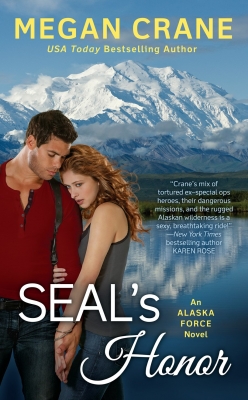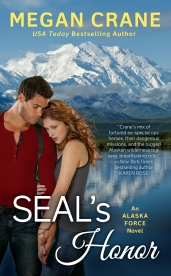SEAL’s Honor
Book 1 in the Alaska Force Series
HEAT
LEVEL:
Satisfyingly Spicy
The first in a new romantic suspense series featuring a rugged unit of former special ops in Alaska’s Grizzly Harbor from USA Today bestselling author Megan Crane.
Out of the dark…
Everly Campbell is desperate. When her roommate is murdered and the body vanishes, Everly fears she might be next. With no one to trust, Everly runs to a remote Alaskan town to find the one man she knows she can count on. His crew of ex-military brothers could be her only hope. Blue wants to keep things all business, but Everly isn’t a little girl anymore and the commanding former SEAL offers more temptation than she can resist.
…Into the Blue
The last thing Blue Hendricks needs six months into his uneasy reentry into civilian life is trouble in the form of his old friend’s kid sister, all grown up and smack in the middle of a dangerous murder investigation. But he didn’t become a SEAL to turn his back on the hard stuff, and he can’t bring himself to ignore Everly’s call for help – no matter how much he knows he’s not fit to be around the soft, vibrant woman she’s become. Not after the things he’s done.
As the men on Everly’s trail draw closer, Blue will do anything to protect the woman he’s starting to think of as his…
“Megan Crane’s mix of tortured ex-special ops heroes, their dangerous missions, and the rugged Alaskan wilderness is a sexy, breathtaking ride!”—New York Times bestselling author Karen Rose
Start reading
SEAL’s Honor
Jump to Buy Links →
Listen to the Audio Excerpt →
CHAPTER 1
Six months ago
You go to the edge of nowhere in a little fishing town in Alaska called Grizzly Harbor. Then you sit in a dive bar called the Fairweather until they find you.
Blue Hendricks must have heard it a hundred times from his brothers in special operations during the usual discussions about what they’d do with their lives if they survived whatever hell they’d found themselves in that day. It was everybody’s favorite legend during a long night in a foxhole.
He threw some cash on the scarred, chipped bar counter that hadn’t seen a polish in a lifetime or three, and faced the fact that he shouldn’t have listened to all those stories. He certainly shouldn’t have believed them. The Fairweather was just another dive bar, if farther away from everything than others, and no one was coming to save him from facing his uncertain future without the navy.
He really should have known better.
Blue didn’t understand what had driven him to come all the way to this nowhere town next door to a frigid glacier or two. It was barely on a map and sat practically crushed beneath a snowcapped mountain.
Not that he was in a place to judge, as he was barely a man.
Now that he was no longer a SEAL, a reality he hadn’t had enough time to digest yet, he wasn’t even the well-tuned machine he’d prided himself on being all these years.
But he wasn’t nearly drunk enough to engage with the mess he carried around and had been pretending wasn’t there for years now. Not drunk enough and definitely not dumb enough to start that game of internal sudden death when he’d been a civilian for less than seventy-two hours, and most of that time he’d spent hauling his ass to the middle of nowhere in search of a stupid legend.
The trouble with that was obvious on numerous levels. The first and foremost being that he was now stuck in the middle of nowhere like a complete dumbass, because the ferry from Juneau stopped here only twice a week in the endless winter months, and that was weather dependent.
The shady, ramshackle Fairweather called itself a bar and grill and seemed to lean more to the bar side of that equation, propped up on stilts above the dark water of the sound that brooded out there in the late February gloom. Blue had seen a decent-looking burger or two and some fries that looked like a heart attack on a plate—his favorite—but he’d decided to drink his dinner instead. It looked like most of the people in here had done the same. The bar itself wasn’t much more than a collection of ratty pool tables, woebegone locals in varying shades of camo-colored clothes, as if a moose hunt might break out at any moment, and what had to be the most extensive collection of off-color bumper stickers ever assembled. As wallpaper.
There wasn’t a single legendary thing about this place.
Which meant Blue was going to have to figure out his life all on his own.
He ran through his options as if he was prepping for a mission. His hometown, outside Chicago, was out. Blue had left that place in a hurry when he was seventeen and had never looked back. Or gone back. At all. He had a Harley stashed in storage in another part of what the folks here in Alaska called the Lower 48, but he would never call himself a biker. And he didn’t want to change that, unlike some of the men he knew who had left the service and gone deep into that life. The same way he didn’t see something like the CrossFit Games in his future. Much as he enjoyed keeping his body in what passed for top physical condition, he didn’t want to make it his whole life. He liked riding his motorcycle and he liked working out, but not enough to lose himself in either one of those things like it was a new religion.
The truth was, he was still hung up on the old one.
Which was why he was here, staring down at a long pour of whiskey and wondering why the hell he hadn’t taken one of the security jobs he’d been offered. They were everywhere. Los Angeles. Chicago. New York. Slick, corporate outfits looking for men with Blue’s set of skills and experience. Some were even run by former SEALs, just like him. SEALs took care of their own, which meant Blue knew he could find a place if he needed one, but he wasn’t ready to be taken care of just yet. He might have retired, and Lord knew he had aches and pains and scars, inside and out, that his seventeen-year-old, newly enlisted self couldn’t possibly have imagined. And it made him feel a hell of a lot older than he was, because he knew what he’d been capable of at his peak—but none of that mattered.
He wasn’t done.
The kind of work he’d done as a SEAL required a pinpoint accuracy he didn’t quite have anymore. He’d accepted that. Part of training to be consistently excellent meant always knowing his limitations. And with young guys coming up all the time, there was no sense holding on when he knew he couldn’t deliver the way he wanted to. He refused to let his teammates and his country down, and Blue might have been carrying a mess or two around inside him, but he wasn’t that narcissistic. If he wasn’t giving two hundred percent at the highest level of peak physical performance, he was holding his teammates back. That was unacceptable.
He was done with his beloved SEALs. But he wasn’t ready to resign himself to a life of playing bodyguard for rich old men and their snot-nosed kids. And he’d believed in what he’d done for the last twenty years, so mercenary work held about as much appeal to him as rolling up to the bikers he’d seen at bars all over these United States and pretending he respected men who brayed about freedom while spitting on everything he’d put his life on the line to defend.
Pass.
The good news was, Blue’s version of a scaled-back level of physical performance, not good enough for the kind of SEAL missions he’d been a part of, made him look like a god in comparison with a regular person. He could still meet all the BUD/S training standards at competitive levels, thank you. He could still kick just about any ass he encountered, for that matter, and could probably defuse the situation before it got there—even out here in an Alaskan bar that seemed chock-full of the kind of men who wrestled bears for fun on a slow winter’s night. He might have been walking among regular people again, but he wasn’t quite a civilian.
The truth was, Blue didn’t have the slightest idea how to be a civilian and didn’t really want to learn.
Which was why he was here, running down legends he should have known better than to imagine could be real.
When he was done with this wild-goose chase into the snowy Alaskan wilderness and had finished surrendering his dignity and self-respect to an urban legend, Blue thought now, he could always kick it up a notch and go deep into the X-Files thing. Head down to the misty forests in Washington and Oregon and look for a Sasquatch, maybe. Go look for UFOs in Roswell. Hunt down the goddamned tooth fairy, while he was at it. All sounded far more likely to be real than a mysterious special ops unit operating out of a fishing village stuck up on stilts in the Alaskan Panhandle, accessible only by boat or plane or summertime cruise ship.
Maybe he’d even chant names into a mirror at midnight with a candle like that old ghost story, to see if something appeared. At least that would provide him with some entertainment.
Blue knocked back what was left of his whiskey and turned to go, figuring he’d find a room in one of the handful of lodges and inns on this mountainous little island and maybe rethink those bodyguard offers after all. Why not trail around after doughy businessmen and self-obsessed celebrities? A lot of guys did it. He was sure he’d adapt eventually.
He’d been a SEAL for twenty years. He was good at adapting. It had been his job. His calling. His entire life.
But when he slid off the barstool and turned to go, automatically checking the exits and any potential problems with a single swift glance, a man walked in.
And Blue froze, because he recognized him.
Not the man himself. He was a total stranger. But Blue still knew him.
He was lethal. A harsh reckoning on two feet, and it was always funny to Blue that men like this—men like him—didn’t set off alarms when they walked into places where normal people went about their lives, never knowing how quick and easy it could all be taken away. And would have been about a hundred times already if it weren’t for all the men like the one who walked toward him.
Like the one Blue saw in the mirror when he could stand to look.
The stranger walked like a marine, and Blue pegged him as Force Recon in two steps. It was something about the grim, ready set to his shoulders and the way he commanded the space around him as he moved, as if he’d already plotted out contingency plans for every possible outcome. He threw an assessing glance around the room, and that confirmed it. More than Force Recon, Blue thought as the man drew closer, moving like a threat. He’d swear this guy was Delta Force, despite or possibly because of the battered jeans he wore, the snow-packed boots like all the locals, and the dark beard on his face that made him look like maybe he was trying to blend into this frontier town the way Delta Force did in all the worst places in the world.
But he blended about as much as Blue did with all these relatively soft, safe people, for all that they were Alaskan and hardier than the average American.
Meaning: not at all.
The man walked directly to Blue and stopped, then lifted his chin by way of a greeting. He didn’t check out Blue’s whiskey shot glass or the money on the bar, but Blue had no doubt that the man in front of him knew exactly how much he’d had to drink, what he’d tipped, and how long he’d been here. All in a single glance Blue hadn’t caught.
He stood straighter, squaring off his shoulders almost unconsciously.
“You look like a SEAL,” the man said, and he sounded like every arrogant SOB marine Blue had ever encountered. Which was to say, all of them.
“You sound like a marine,” he replied. The eye roll was implied.
The other man studied him a moment.
“You feeling a little antsy?” he asked gruffly. There was hint of a smile on the other man’s hard face, but it didn’t take. “I get it. You’re not underwater, which means there’s no place for a SEAL to hide while the serious shit goes down.”
Blue eyed him like he was thinking about taking offense, when instead the traditional obnoxious greeting between different branches of the military made him feel more relaxed than he had in a long time. As if he might just make it on the other side of active duty after all.
“Nice town.” He offered a bland grin. “Until you and your marine buddies roll in and start blowing it all up, that is.”
The other man didn’t grin in return, but his eyes crinkled slightly in the corners, which was as good as a belly laugh from an individual carved out of pure steel and trouble like this one. He nodded at the stool Blue had vacated, waited for him to slide back onto it, then claimed the one next to him. He lifted a couple of fingers in the bartender’s direction.
Blue knew three things then. That this was a man used to leading other men. That the places he led them were likely versions of hell, but he brought them back out again, one way or another. And that he led by example. Which was all Blue needed to know.
They sat there in comfortable silence. Chris Stapleton rasped his version of quiet Southern despair on the jukebox. It seemed fitting even this far north and west. There was the clink of pool balls and the rise and fall of various alcohol-infused conversations in the background, here in a place that hadn’t seen much sun in a while.
Blue studied the whiskey in front of him and used the mirror behind the bar to stay alert to the man who exuded so much menace and calm beside him.
“Just out?” the man asked after some time had passed.
“Less than seventy-two hours ago.”
“No wonder you have that new-car smell. Don’t worry. It wears off.”
Blue grinned at that, and raised his whiskey glass in a salute that was only half-mocking. He took a pull, then returned his attention to the bar mirror. There was a pack of four outdoorsy-looking men in the corner getting rowdy with a busty waitress who didn’t seem at all fazed—or impressed—by their attention. There were more men at the pool tables, telling one another fishing stories Blue didn’t have to hear any details of to know were exaggerated, if not outright lies.
And he figured it was the bartender who’d recognized what Blue was and called the man beside him. Unless this place was wired, but Blue had done his usual surveillance when he’d come in, and he hadn’t seen any cameras. His money was on the old man behind the bar with a mouth that looked as droopy as his mustache and a map of questionable decisions all over his face.
“It’s hard to find a way home,” the marine said quietly. Almost offhandedly, but nothing about the man sitting next to him was anything but ruthlessly deliberate. “Takes a while.”
Blue met his gaze in the mirror. The other man’s was hard like flint, gray and sure. Steady.
“I don’t know what home is,” Blue said. If his voice was rough, he blamed it on the whiskey. Not stray memories of his tense childhood in that house outside Chicago he never wanted to see again, because he’d never considered it his home. Not the friends he’d lost on too many missions to count, who would never make it home at all. “I stopped looking for one a long time ago. What I want is a mission.”
And that was when the man beside him smiled.
“You can call me Isaac, brother,” he told Blue, like everything was settled. Then he lifted his own glass. “Welcome to Alaska Force.”
CHAPTER 2
“You must remember me,” said the woman who’d just screeched to a noisy halt in the dirt that passed for a driveway out behind the rickety old lodge. Blue was standing guard in the endless Alaskan summer sunshine, pretending he wasn’t doing just that. As if someone would just be standing around aimlessly at the end of a road only fools ever tried to drive, but the woman didn’t look like the sort who would make that distinction.
Much too soft, even with that haunted look on her face.
She threw herself out of the car as if she had someone on her tail. Blue knew she didn’t, because they’d been monitoring her approach since she’d turned onto the only road—such as it was—that eventually led from Grizzly Harbor and over the usually impassable mountain to the back side of this remote Alaskan island. Where the deliberately hard-to-reach headquarters of Alaska Force was spread over what had once been a summer fishing retreat for the very hardy and very, very rugged.
Neither was a term Blue would use to describe this woman. She was delicate. Above his pay grade, if he had to guess from the quality of her clothes. And as weak and insubstantial as the jacket she wore against the ever-changeable and usually cold Alaskan summer weather.
But she surprised him by taking a few steps in his direction until something, maybe a belated sense of self-preservation, made her stop and sway on her feet.
“We grew up on the same street,” she insisted. “I’m Everly Campbell.”
And Blue didn’t want to remember her. He opened his mouth to claim he didn’t.
But he did.
The last time he’d laid eyes on little Everly Campbell, she’d been a pudgy, solid thing with pigtails and a too-solemn expression, waving at him from the back of her ridiculously girlie bike on the street where his mom and stepdad still lived.
He doubted he’d waved back.
What he really remembered was the bike, not the girl, he told himself. The bike had been bedecked with too much pink and actual streamers that flapped around when she rode it in those irritating, incessant circles in the street between their houses. Some mornings he’d heard the snapping sound they made from his bedroom up under the eaves in his stepdad’s harsh, bitter house, long before his lazy teenage butt had wanted to be awake. If he’d thought about the girl across the street at all, it had been because little Everly lived exactly the kind of charmed American Dream life—two doting parents, a popular jock brother, a set of golden retrievers, even a freaking white picket fence—that Blue thought everybody deserved and, more, had joined the navy to protect.
He’d enlisted the day after his high school graduation, left behind the commuter town outside Chicago where they’d grown up, and gone out of his way not to think about either it or her since.
Until today.
Blue liked his past where it was. Buried and forgotten. Not up in his face on a southeastern Alaskan island so difficult to reach it operated as a kind of natural fortress.
“Come on, you must remember me,” said the woman who was definitely Everly Campbell, all grown up and not the least bit pudgy any longer. She sounded far more confident about his memory than she should have, to Blue’s mind, given it had been so many years. A lifetime. He crossed his arms over his chest and eyed her where she stood in the overgrown yard next to her haphazardly parked car, which he could tell at a glance was a rental. With Chicago plates. Which suggested she’d actually driven the three thousand or so miles to get here, give or take a ferry or two. “You and my older brother, Jason, are friends.”
“I don’t have friends.”
That was strictly the truth. Blue had brothers-in-arms or acquaintances, nothing in between. He liked it that way.
“Fine.” Everly sounded more strung out and desperate than simply impatient, which rubbed at his hero complex like an itch he couldn’t scratch. But he was trying to get over his hero complex. Mostly. “You did in high school.”
His memories of high school were dim and blurry, focused more on his stepdad’s temper than whatever weak teenage nonsense had cluttered up his days. And he didn’t really want any clarity on lost and happily forgotten yearbook crap, especially since he’d never bothered to pick his up, much less collect signatures from people he didn’t want to remember.
Everly took another ill-advised step toward him. “Jason played football.”
“Good for Jason. I didn’t.”
“I know that. But the two of you hung out. He knows what you’ve been up to all these years.” Something about Blue’s expression must have penetrated, because she swallowed. Hard. “I think he kept in touch with one of your stepsisters?”
More crap Blue didn’t want to think about.
“High school was a long time ago, little girl.”
But that only made her face light up, which was the exact opposite of what he’d intended.
And to add insult to injury, she was pretty. Very pretty.
Damn it.
“See? You remember me. No one calls a grown woman little girl like that, all raspy and dark and menacing, unless they’re trying to make a point.”
Good thing she was irritating. “‘Raspy and dark and menacing’? Really?”
Everly waved a hand, and though something about the gesture stuck him as frantic rather than dismissive, he ignored it and kept his gaze trained on her face.
“I’m descriptive. It’s part of my job. Now it’s second nature, basically.”
All of this sounded like trouble, but not the kind Blue liked to handle and was trained to solve. This sounded instead like the kind of trouble he’d been avoiding for the past twenty years. The kind of trouble that came with his mother’s bad choices and his stepdad’s late-night rants and all those choking, suffocating ties of stepsisters he’d never wanted and neighbors he’d never chosen and people who wanted something from him when he didn’t respect them. When he couldn’t and wouldn’t respect them.
Pass.
There was a reason he never went home. And never would. The last thing he needed was a specter from that time, right here in front of him like his past had a rental car and an evident death wish.
“I don’t care,” Blue said, his voice hard. “About your brother or your job.”
He didn’t say or you. He figured that was implied.
Everly sighed at that, but she didn’t deflate. She also didn’t slink back to her car and leave, the way she should have if she’d possessed even the barest hint of self-preservation. And for a moment there was nothing but the sound of the tide coming in, the summer breeze hinting at the coming fall weather, although the air was still warm enough in the afternoon sun. Not that cold bothered Blue much. He’d spent so much of his life uncomfortable, courtesy of the United States military, that the alternative made him edgy.
The woman standing there in front of him was just a new form of discomfort.
Everly Campbell should not have been anywhere near him. She shouldn’t have been able to find him in the first place, much less remind him of the life he’d led before he’d become a SEAL. She should not have been within a ten-mile radius of him, because the kind of blood Blue had on his hands never washed off and he’d stopped trying, and she was still made of picket fences and cute little dolls and happy golden retrievers who rolled around in leaf piles. All that sweet suburban happiness hung around her like a kind of mist.
He wanted no part of it. Or her.
But it didn’t keep him from noticing that she was definitely not a little girl anymore. Blue bet she despaired over the curves she’d packed into skinny jeans, a T-shirt with something cute on it, and a sleek blazer in a too-bright shade of blue. Despair was not the word Blue would use to describe those curves, however. Not when his mouth was watering.
She’d lost the pigtails. Her hair was strawberry blond, hanging in long layers around a face that begged for a man’s hands. Her face was a problem. Straight up. Sweet and smart at once, with a wide mouth that invited all kinds of deeply impure thoughts.
Blue had spent years filled with only impure thoughts, happily, but he refused to entertain such notions about Everly Campbell.
For more than a perfectly understandable moment or two, that was, because he wasn’t dead.
He reminded himself that she’d careened over the long, unmarked road that was officially called Hardy’s Pass but was colloquially known as Hard-Ass Pass. It was the only road on the island during the roughly seven days a year it was not actively treacherous. It led directly to the sprawling lodge here in the cove, ramshackle wood cabins connected by wooden stairs and boardwalks, where Blue had been living since the night Isaac had turned out to be a whole lot more than a legend. With a handful of other brothers-in-arms who’d gotten out of the special forces just like he had and shared not just his desire for a mission but a great many of his own very specialized skills.
At least three of them had weapons trained on her right now.
Not because they thought she was a threat, of course. No one who intended to do harm out here—a good thousand miles west of the middle of nowhere—would roar up blaring classic Bruce Springsteen and then jump out the way she had, calling his name like they had been tight, once upon a time. Alaska Force wasn’t just a home for wayward veterans who hadn’t quite adjusted to civilian life. Isaac hadn’t set it all up in the fishing lodge his family had once operated as a summer tourist trap out of the goodness of his heart.
Alaska Force was a last resort for people who needed very serious solutions to very complicated problems.
No one came here for fun. Mostly, no one dared come here at all. Especially without an invitation.
Blue refused to accept that Everly had the kind of problem she’d need a man like him to solve.
No matter how pretty she was.
“Great to catch up on old times,” he said while she was still frowning at him, likely considering another run at him with more memories he didn’t want to entertain. “Really. If you survive another pass over that road, which I have to tell you is unlikely, make sure you tell your mom I loved her oatmeal cookies.”
Everly’s frown deepened, and that was a head trip. He remembered the little girl on her nauseating pink bike, and yet the woman in front of him made him . . . greedy. Restless in ways he understood perfectly and refused to indulge. No matter how much he wanted to strip off her funky blazer and help himself to—
Stand down, he ordered himself. Especially that part of himself that wasn’t listening to anything but the surprising need pounding through him.
“My mother is a thoracic surgeon,” Everly replied after a moment. “She’s never baked an oatmeal cookie in her life.”
Blue didn’t give an inch. “You need to go home, Everly. Wherever that is.”
“Chicago. And I can’t.”
“You can. If you don’t feel like suicide by mountain pass, take a seaplane somewhere a whole lot safer than Alaska, which is pretty much anywhere else. You don’t belong here.”
“I can’t.”
She took a step closer to him, and this time she didn’t seem to think better of it. Blue was giving her a look he knew from experience made grown men back off and fall all over themselves to apologize, but Everly took another step toward him instead, which put her in arm’s reach.
A very bad call on her part.
“That wasn’t a suggestion so much as an order, sweetheart,” he growled at her. “I don’t know what you think you’re doing here. I don’t have any interest in running down memory lane. High school sucked. I don’t talk to my stepsisters and I don’t care if your brother does, because I don’t talk to him, either. I guarantee you that whatever you want, I can’t help you.”
“If you can’t, no one can,” she said, and there was that strung-out, desperate thing in her voice again. He could see it all over her. It made her distractingly pretty green eyes in that problematic face of hers shine too bright, as if she was fighting back tears, and that was it. He was boned.
Blue wasn’t built to ignore a cry for help.
Especially not from a pretty woman who’d known him when he couldn’t help anyone, not even himself.
Behind her, he saw one of his Alaska Force brothers drop soundlessly from the tree where he’d hidden himself like the terrifyingly accurate marine sniper he was, because threat or no threat, anyone who rolled up on the lodge here in Fool’s Cove was an opportunity to practice for the inevitable day when it really was an adversary. Griffin Cisneros nodded coolly at Blue, then melted off around the far side of the lodge like the six-foot-two ghost he was, all glacial focus and ice straight through, so quietly that Everly never knew he’d been there. It was one of his specialties.
But Templeton Cross—ex–Army Ranger, ex–Delta Force, and always happy to play the jackass—took a different approach. He strolled on down from the command station in the trees where he’d been the one to clock Everly’s rental car roaring down the winding, dizzyingly steep mountain road in the first place, a huge smile on his face like this was a party.
“You didn’t tell us you had friends,” he said, aiming that giant grin of his right at Blue. “I had money riding on you being born mean and alone.”
“I don’t have friends,” Blue said. Again. He scowled at Everly as she gazed up at Templeton, who was six feet and four inches of a beautifully mixed DNA cocktail that made the average female walk into things when she saw him. Blue reminded himself that he had no reason to care that Everly appeared to be maintaining that average. “Everly isn’t a friend. And she’s leaving.”
“I apologize for his manners,” Templeton told her, with exaggerated courtesy, probably because he knew exactly how much that made Blue want to take a swing at him. “Sometimes I think he was raised in a sewer.”
“A four-bedroom suburban Colonial, actually,” Everly replied. She shrugged when both men stared at her, her gaze shifting back and forth between them like she didn’t know which one of them she found more intimidating. “I grew up across the street.”
“A figurative sewer.” Templeton stuck out his hand. “Templeton Cross, ma’am. It’s a pleasure to meet anyone who can get under my man Blue’s skin, a feat I personally would have told you could not be accomplished without a bullet, some luck, and very good aim.”
Blue shoved Templeton’s outstretched hand away from Everly before she could take it, and opted not to question that move. Or the way the other man grinned wider, as if he didn’t need to question it because he already knew the answer.
“I will never understand why Isaac doesn’t keep you on a leash,” Blue muttered.
“Isaac would never put me on a leash,” Templeton explained to Everly, who hadn’t asked. As if he didn’t see Blue slowly losing his cool right there next to him, when Blue was quite certain he did. “That would be a deep violation of the bonds of brotherhood, obviously, but would also hurt my feelings.”
As if anything could hurt him. The man was as bulletproof as he was deceptively talkative. All that chatter lulled the enemy into a false sense of security, because Templeton was one of the deadliest men Blue had ever met. And Blue pretty much knew only the most lethal individuals alive.
He didn’t bother telling Templeton to STFU again. It would only delight him.
“Get in your car,” Blue ordered Everly. “And go before the next rain, which will probably be tonight, when half of that pass will wash out again and you really will die up there.”
“They think I murdered her,” Everly said instead, looking startled, as if she hadn’t expected to speak. But the words kept coming. “They can’t decide if I’m a cold-blooded killer taunting them with my crimes or a very sick woman who doesn’t know she’s committed them in the first place.”
Templeton went still and intent, while Blue studied the paleness in her cheeks and the lack of any mascara, which he should have paid attention to earlier. It was unusual for a pale redhead with copper lashes like Everly to go without, and slightly jarring when he really looked at the preciseness of her haircut and how it was clearly meant to showcase her face in a very specific manner. Her haircut and the clothes he’d already identified as high quality told him she was a woman who probably wore makeup, but wasn’t today.
If she hadn’t been Everly freaking Campbell, shouting out his name in the middle of Alaska like a blast from the entirely unwanted past, he would already have noticed that.
And then there was the fact the jeans she wore were faintly baggy in the knees, which suggested normal wear, but also at the waist, which hinted that she’d lost a few pounds—maybe too quickly to get a belt or a smaller pair. Her fingernails were short—too short for a woman who wore jeans so obviously expensive and a pair of flats in a complicated metallic color with teal soles that he knew at a glance cost as much as or more than the jeans and certainly had no business in a glacial wilderness. The way the blazer fit her told the same story, and made her ragged nails that much more of a tell.
And he felt like a dick. Because he’d been so busy fighting with ghosts in his head that he’d deliberately missed the fact that Little Miss American Pie was actually here because she was in trouble, just like all the other lost and tortured souls who found their way to Isaac’s remote hill and the deadly little army he’d assembled here.
“Who did you kill?” he asked casually, and she flinched.
“Rebecca. My roommate. But I didn’t kill her. I saw her get killed.” She swallowed, hard. “I think I did. I mean, I know I did, but there’s no proof, because when I got back with the police, there was nothing there.” She looked too vulnerable, suddenly. “Or maybe the police are right and I’m a complete psycho. Either way, I need help.”
Blue exchanged a swift look with Templeton. His brother nodded, then headed toward the lodge to assemble the team in the big room, once a lobby, they used as the official Alaska Force office when there was a client around. Blue waited until he heard the door swing shut behind Templeton and then he moved closer to her. Too close, if he was honest. Because now he could see the way her pulse throbbed in her neck, and that wasn’t going to help anyone. It only made him feel more greedy.
The kind of greedy that was a hell of a lot more trouble than he planned to get into, no matter what she had or hadn’t done.
Maybe if he kept telling himself that, he’d keep his hands to himself.
He tilted his head to one side. “Do you think you’re a psycho?”
“If I thought I was a psycho, I wouldn’t have driven twelve hours a day for almost five days straight to find you when the police told me to stay put,” she threw at him, in a tone that told him she was barely holding on to her own composure.
On some level he was glad. It meant it wasn’t just him losing it today.
“Why did you? What made you think that hunting me down was a good idea?”
For a moment she looked more lost, and Blue had no idea why he had the urge to reach out to her then. He repressed it. Hard.
“Because,” she said.
“That’s not an answer.”
“Because you’re . . . you.”
Blue sighed. “Let me guess. Your brother lives some soft, sad life somewhere, and he likes to get off thinking back on his glory days in high school like every other douchebag with a soft, sad life. And he thinks I owe him something because back when we were teenagers, he wasn’t a complete dick to me. Is that why you’re here? Your brother thinks that all these years later I’m his pet commando because we were lab partners for five minutes one time?”
Everly rocked back on her heels then, and suddenly she didn’t seem quite as lost. But the strangest thing was that he did, with the way her green gaze met his and held, as direct as a touch, when he had no intention of letting her touch him. That way lay nothing but madness, he could tell. She had that look.
To say nothing of her connection to all that unfortunate history he wanted to forget.
“Jason is a pediatric surgeon who does Ironman Triathlons in his spare time,” she said after a slight pause. She didn’t bring up the oatmeal cookies her mother didn’t bake. Or the fact Blue kept reading her wrong, because he wanted her to be dismissible. He really, really wanted it. “I don’t think he’s sad, but what would I know? I’m his sister and he lives across the country. He doesn’t tell me all his stuff.”
“I’m sure he’s a terrific guy.” Blue glared at her and she still didn’t crumple, and that meant either she really was a suicidal psycho—though, as much as he wanted to, he didn’t get that vibe from her—or she was an even bigger problem than he wanted to face. “Maybe if I’d thrown a few footballs around on summer evenings, I’d be a terrific guy, too, but that ship sailed a long time ago. And I mean that literally. I was in the navy.”
This time when Everly frowned at him, it was more than a head trip. The breeze picked up her hair and he could feel it brush against his arm below the sleeve of his T-shirt. And the way she looked at him made something inside him kick, hard.
It wasn’t pity. He wouldn’t have taken that well.
But he thought maybe this was worse. It looked a whole lot like compassion.
“You’re a hero, Blue,” she said quietly, but with conviction. As if that was an undisputed fact instead of a complex he was working to eradicate. And more to the point, a lie. “That was why Jason told me to find you.”
Then she reached over and made everything much, much worse by putting her hand on Blue’s arm.
He didn’t want this. The shock of connection that slammed through him, like he’d never had a woman before. That sympathetic gleam in her eyes. The fact she didn’t just need him, but knew him—or some old version of him he hadn’t considered him in years.
He didn’t want any of this.
Blue didn’t know why the fact she’d known him when he was scrawny and weak was so powerful. She should have been nothing to him except the memory of a pink bike outside a dismal house he’d never considered his home in the first place. He didn’t know why she got to him at all. Or why her hand on his arm seemed to burn its way through him, like she was leaving new scars on his battered skin. And then lighting him up, deeper still.
He didn’t like it. Any part of it.
“Please, Blue,” Everly said softly, as if she trusted him on a personal level. Not just for his skills and abilities. When she had no reason whatsoever to do something so foolish. “Will you help me?”
He knew he was a goner when he didn’t fight it. When he only looked down at her as if he really was the hero her brother imagined he was. Blue knew better. If he was any kind of hero, he wouldn’t be here. He’d be done. He’d be kicked back somewhere, trailing movie stars and collecting cash, instead of paying more penance in Alaska Force.
Heroes didn’t need another mission. Heroes had nothing to prove.
But that didn’t mean he couldn’t play the part for a little girl who’d gone and grown up pretty, and looked at him as if he could move the whole mountain that loomed behind them if he chose.
He’d never so badly wanted to be someone he wasn’t. Not even when he was seventeen and still believed he could live up to the legend of his long-lost father. Not even when he’d been that deluded.
“I’ll help you,” he told her, just to see her green eyes light up.
And regretted it the minute he said it, because Templeton was right. Everly Campbell got under his skin.
The smart move would be to send this woman back into whatever mess she’d made to handle it on her own, because no matter what it was, it couldn’t possibly be as bad as the things he’d done.
But while Blue might not have been a hero, he was a man who kept his promises.
If she could be saved, he told himself, he’d save her. For that scrawny kid she remembered who’d never managed to save himself or anyone else. Blue, on the other hand, was a lost cause. Some men had been born damned, and he was one of them, no matter how many Everly Campbells he tried to save.
And no matter how distractingly pretty she was.
So Blue sucked it up, promised himself he’d never give in to that greedy hunger within him, and led her inside to meet the rest of the reprobates who made up Alaska Force, before he thought better of it.
Before he came to his senses and sent her home.
End of excerpt
Audio Excerpt
SEAL’s Honor
Rebel Heart Books is my absolute favorite bookshop. I'd love it if you'd support this woman-owned, delightful place where you can also get signed copies. See if this book is available through them. Thanks!

SEAL’s Honor
is available in the following formats:
eBook:
Print:

Reviews
SEAL’s Honor
An emotional and moving story filled with sexual chemistry, fun dialogue, and endearing characters that is not to be missed.
- Eileen Wells
SEAL’S Honor is filled with action, mystery, passion and the healing of a warrior’s heart.
- Lorelei’s Lit Lair
I loved this book because it absolutely had it all: drama, suspense, romance, sexual chemistry, sexy alpha men and the promise of a great series!




 Book 2
Book 2 Book 3
Book 3 Book 4
Book 4 Book 5
Book 5







